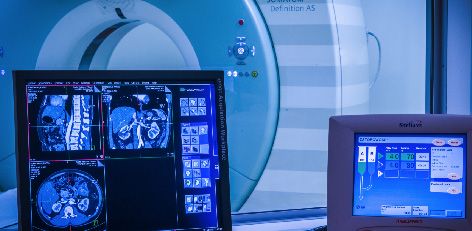Magnetic resonance is a non-invasive method for imaging soft tissues using magnetic properties of hydrogen nuclei, present in various forms and at various levels in the whole body. Scientific research on magnetic resonance imagining was initiated over 40 years ago.
This method shows lesions in soft tissues, and is particularly useful for prostate cancer. This scan is used for finding lesions below or equal to T2 according to TNM classification in a dedicated magnetic resonance imaging of the prostate, and equal to or above T3 to show infiltrations of cancer lesions. In prostate cancer, examination of the lesser pelvis is useful in searching for abnormally enlarged lymph nodes, showing their morphology and a type of a contrast agent used. An abnormal image of lymph nodes may suggest progression of cancer lesions and is an important information for a doctor in charge of the case and the patient in selection of further treatment. Furthermore, the scan evaluates bone structures to exclude cancer lesions.
The scan takes about 40 minutes to one hour and is completely painless. During the scan the patient is administered an intravenous contrasting agent, different than during the computed tomography. This agent is not based on iodine but on gadolinium compounds. Gadolinium-based contrasting agents have less contraindications and are better tolerated by patients. Before the examination, the patient receives a questionnaire with risk factors listed.
The main ones include:
- A history of allergic reaction to a gadolinium-based contrasting agent
- eGFR below 30mL/min/1.73m2
When the Patient is aware of any contraindications for administration of gadolinium-based contrasting agent, please, inform a doctor performing the scan.
See also

WHOLE-BODY MAGNETIC RESONANCE IMAGING
Diagnosis is this stage of any treatment that is of crucial importance for its successful outcome. Without well diagnosed condition and disease type, it is difficult to manage it successfully. Therefore, at HIFU CLINIC Prostate Cancer Treatment Centre we ensure all diagnostic procedures are accurate, complete and correct. One of them is whole-body magnetic resonance imaging (MRI/wbMRI). This technique brings Continue Reading

PROSTATE CANCER – DISEASE PROGRESSION
The prostate cancer is usually a cancer characterised by a relatively mild course - it develops very slowly, and metastases or infiltrates surrounding tissues relatively late. Therefore, regular monitoring of the PSA factor and healthy lifestyle are of crucial importance. Unfortunately, in Poland this cancer is still diagnosed at advanced stages, with much worse prognoses. Am I in a Continue Reading

WHAT IS THE PROSTATE?
This small gland has a very important role in a man's body. The prostate produces whitish alkaline fluid in which sperm is suspended. This secretion produced by the prostate is one of the main components of sperm, and is of crucial importance for male fertility. Where is the prostate located? The prostate, not larger than a normal chestnut, is an Continue Reading

